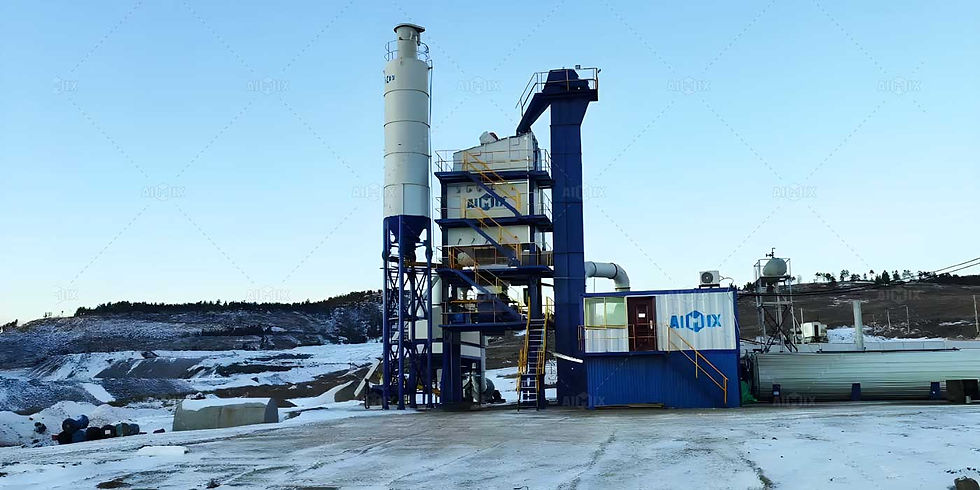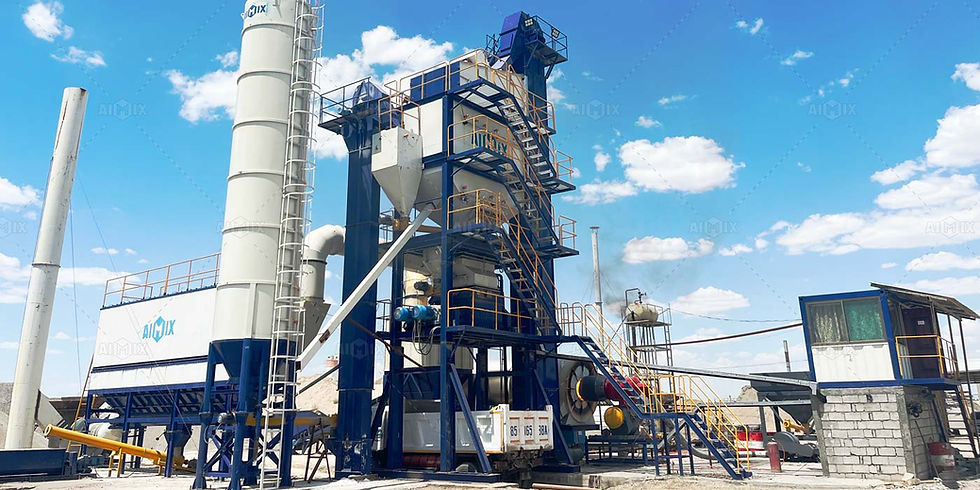Is It Possible To Meet Tight Deadlines With A 20–30 TPH Mini Asphalt Mixing Plant?
- aimixglobal5
- Aug 26, 2025
- 3 min read
In today’s construction industry, meeting deadlines is just as important as controlling costs. Contractors often face pressure to deliver asphalt quickly while maintaining consistent quality. A 20–30 TPH asphalt mixing plant mini seems like a compact choice, but the big question is: can it really help you meet tight project schedules? Let’s explore this topic from a practical point of view, considering the needs of contractors, project owners, and road builders.

Understanding The Role Of A 20–30 TPH Mini Asphalt Mixing Plant
A small asphalt plant for sale with a capacity of 20–30 tons per hour is designed for small to medium-sized projects. It produces asphalt in batches that are suitable for rural roads, urban maintenance works, or small construction sites. Because of its scale, it is often preferred by contractors who need mobility, lower upfront investment, and steady production.
However, understanding the role of this plant goes beyond capacity numbers. Contractors want to know whether such a plant can help them meet strict delivery times when projects are under pressure. To answer that, we must look at production efficiency, setup speed, and real project applications.
Production Efficiency And Consistency
Efficiency is the first factor that determines whether deadlines can be met. A 20–30 TPH plant produces asphalt continuously at a stable pace. Although its output is smaller compared to larger stationary plants, it often compensates with fast start-up, lower fuel consumption, and steady material flow. This means contractors can plan work more accurately without wasting hours waiting for supply.
Moreover, consistency matters. If asphalt quality varies, contractors risk rework, which delays progress. Mini asphalt mixing plants are equipped with precise control systems, helping maintain uniform temperature and material proportions. This consistency ensures asphalt is ready to use immediately, reducing on-site delays.

Mobility And Quick Installation
Time is not only about production but also about setup. Mini asphalt plants are compact and mobile, allowing fast relocation between job sites. Instead of waiting for deliveries from a distant commercial supplier, contractors can produce asphalt right at the project location. This reduces transport time, minimizes material loss, and increases work speed.
In practice, this mobility is especially valuable for projects spread across different areas, such as rural road rehabilitation or urban maintenance. By cutting down on logistics, contractors gain more control over their schedules and reduce risks of delay.
Project Applications And Deadlines
Different projects have different timelines. For example, a small road extension in a city may require only a few hundred tons of asphalt. With a 20–30 TPH mini hot mix plant, this volume can be produced steadily within a few days, keeping the project on track. In contrast, for massive highway construction, the same plant may not be sufficient on its own. However, it still adds value when used as a supplementary unit near the site.
Therefore, the key is to match plant capacity with project size. For contractors who handle multiple smaller contracts, the 20–30 TPH plant provides enough flexibility to meet deadlines without relying on external suppliers. In turn, this leads to better customer satisfaction and repeat business.

Balancing Cost And Deadline Pressure
Deadlines are always linked to cost. Delays mean penalties, additional labor, and client dissatisfaction. Using a mini asphalt plant helps reduce these risks. Since contractors control their own production, they avoid price fluctuations from third-party suppliers. They also save on transport, which lowers overall project expenses. As a result, they not only meet deadlines but also protect profit margins.
At the same time, owning a plant ensures contractors are not at the mercy of external supply chains. This independence becomes a competitive advantage when clients need quick delivery on short notice.
Is A 20–30 TPH Plant Enough For Your Project?
The answer depends on your project scale and timeline. If you manage road repairs, community roads, or small development sites, this plant size can absolutely meet your deadlines. If you run larger infrastructure works, it can serve as a backup unit or as a strategic addition near remote sites. The real benefit lies in flexibility and independence, giving contractors control over their schedules and outcomes.

Conclusion: Take Control Of Your Project Deadlines
Meeting tight deadlines in road construction is possible with a 20–30 TPH mini asphalt mixing plant, provided the project scale matches its capacity. Its efficiency, mobility, and independence from external suppliers make it a smart choice for contractors focused on timely delivery. Instead of relying on uncertain supply chains, you gain direct control over asphalt production and project timelines.
If you want to explore whether a mini asphalt mixing plant fits your projects, we are ready to help. Our team can assess your needs, recommend the right configuration, and provide reliable equipment that supports your business growth. Contact us today to discuss your project plans and secure the advantage of faster, more controlled asphalt production.



Comments